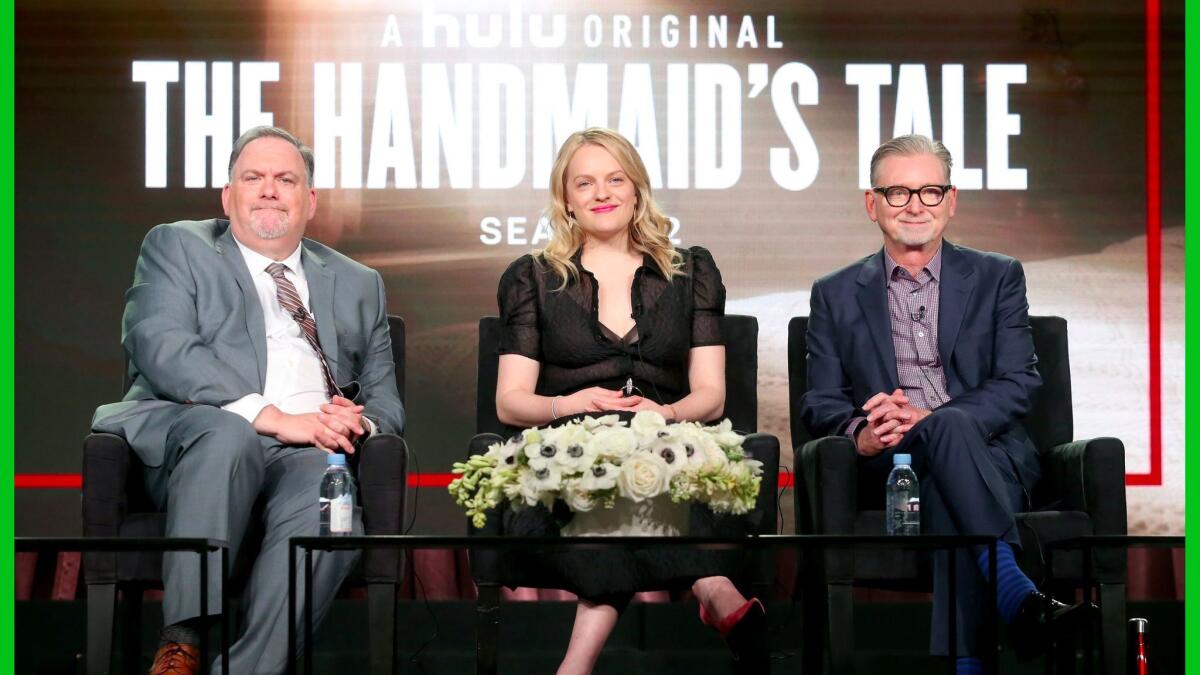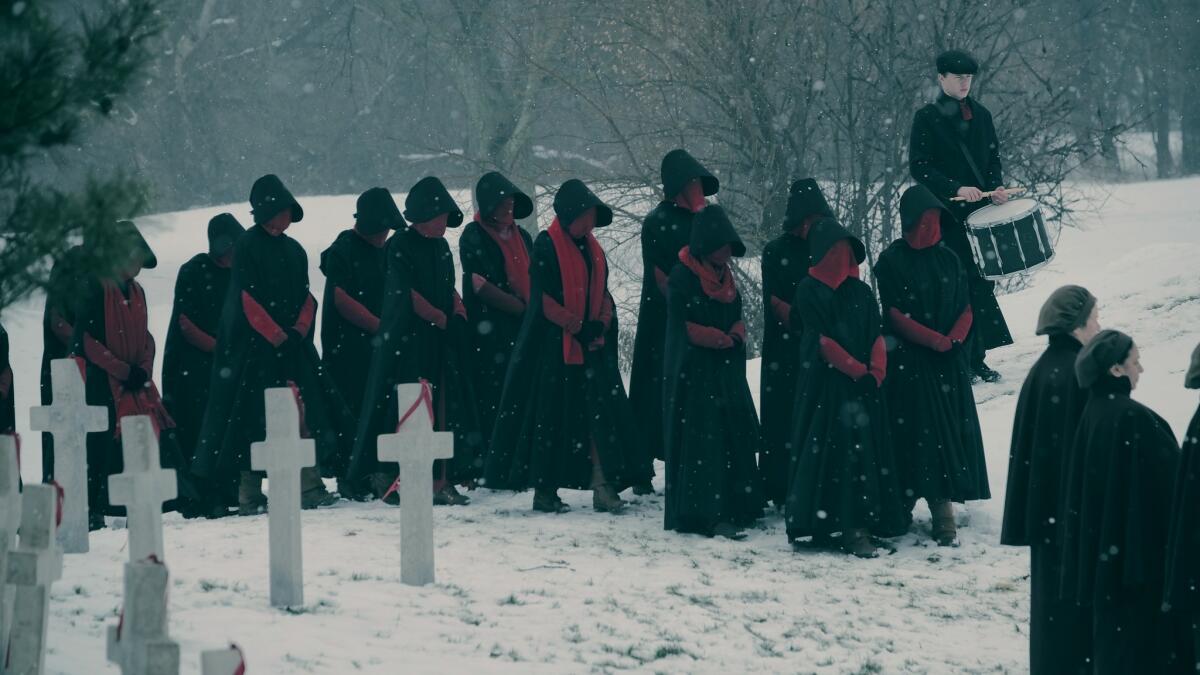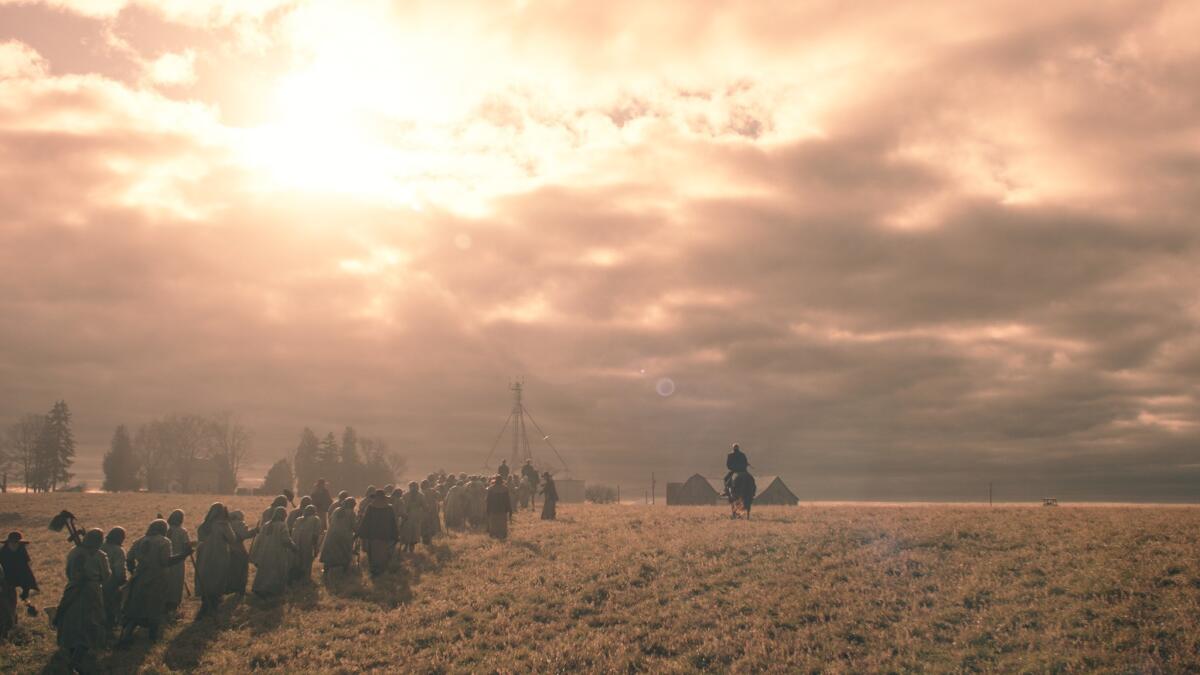Q&A: ‘The Handmaid’s Tale’ showrunner promises ‘real hope and victory’ from surprising places in Season 2
- Share via
Season 2 of “The Handmaid’s Tale” may be moving past the narrative of the book on which it is based, but that won’t prevent it from delving deeper into its dystopian setting.
The Hulu drama, adapted from the 1985 novel by Margaret Atwood, will return on April 25. Viewers can expect to learn more about the historical events that led to the creation of Gilead and venture to the not-previously-shown Colonies, the badlands outside Gilead where prisoners essentially go to die.
Executive producers Bruce Miller and Warren Littlefield said as much when they gathered Sunday — along with star Elisabeth Moss (June/Offred) — at the Television Critics Assn. press tour in Pasadena to discuss the new season in broad, nonspoilery terms.
The series is set in a near future in which the U.S., amid falling birthrates, has been seized by a theocratic regime unfavorable to women’s rights. Moss plays a still-fertile woman separated from her family and forced to become a breeder.
At the end of Season 1, a pregnant Offred was whisked away in a van — her destination and future unknown.
“So much of [Season 2] is about motherhood,” said Moss, who is also an executive producer on the series. “Bruce and I always talked about the impending birth of this child that’s growing inside her as a bit of a ticking time bomb, and the complications of that are really wonderful to explore. It’s a wonderful thing to have a baby, but she’s having it potentially in this world that she may not want to bring it into. And then, you know, if she does have the baby, the baby gets taken away from her and she can’t be its mother. So, obviously, it’s very complicated and makes for good drama. But, it’s a very big part of this season, and it gets bigger and bigger as the show goes on.”

Miller, who was tight-lipped about revealing too much about the season, announced that Marisa Tomei would guest star as the series visits the Colonies.
The Times spoke with Miller, the showrunner of the drama, later in the day about moving past the source material, the pressures of keeping the momentum going and what viewers can expect in Season 2.
The first season ended where the book ended. What were your conversations with Margaret like about shaping Season 2?
We started having conversations about halfway through Season 1. The book, infuriatingly in the best way, cuts off. So I had been thinking about what happens next forever — I read it in college in a new fiction class. But Margaret had also been confronted by questions for the last 30 years about, “So what happens next?” So “what happens next” was a question we had been pondering for three decades. It ended up being not only a lot more fruitful, but a lot more fun. It was finally this chance to go, “Oh, my gosh, we can do this, we can do this.” I think the first conversations were about … how do we continue Offred's story? And building out from that. About this woman in this world, with these pressures, with these desires. The show is very much about Offred. With that in mind, you get a structure very quickly: “OK, she's pregnant. So how does that shape the season?”
I really look at it from a character point of view, and so does Margaret, so we talked about that, and I have definitely more TV dramatic sensibility than she does, which she loves. The fact that I'm thinking cliffhangers — just because no matter what, you want the show to be entertaining. I'm incredibly glad that people are inspired to action by it. But if it isn't entertaining, it doesn't matter. Nobody watches it. You don't want to make some medicine. Even if it's scary, you want people to feel something.

Did you find that you overlapped a lot about what you thought happened next?
It's funny, because I usually go into those conversations having not made decisions myself, and I start by listening. Listening to Margaret, listening to our other writers, listen, listen, listen. And then you start to let things coalesce. But the thing that I was excited about is that Margaret had really thought a lot about what happened in the 20-year period between the end of the narrative of Offred and the beginning of the academic historical notes in the book. So she had lots of things that were, “this could happen, this could happen.” A lot of it was thinking, “Is this a Season 2 thing or a Season 8 thing?”
The show is a critical favorite, an awards favorite. All eyes are on you.
You have to work at not letting it overwhelm you. It certainly does overwhelm you no matter what. And you just have to let it overwhelm you and then get back on and do your job. I think all of us — actors, directors, writers included — it's hard to sit down and write when you've got an Emmy sitting in the middle of your keyboard. So you gotta take that, throw it away, and start writing the show again.
Strangely, I was feeling a lot more pressure before I started writing. Once we sat down in the writers room, that kind of goes away. And luckily, we sat down in the writers room a long time ago, so a lot of this stuff, this recognition, came after. But the biggest stumbling block for Season 2 of any show is Season 1.
Has it surprised you how timely and relevant this show has been and continues to be?
Oh, shockingly, yes. The show feels unfortunately relevant. I'm hoping very soon that our show goes into obsolescence. And the horrible thing is that when you really are teasing apart a central feminist book like this and you're teasing apart, not the politics of it, but the human beings and how they act, and how did it resonate so much with me, and with so many other people for so long, you're kind of teasing it apart in that way — I just think you appreciate how those arguments are put together, and what people are thinking about, what people are suffering with and struggling with. And so, when you come out the other side, and you're making the show, you feel, honestly, in awe of the people who are actually going through the struggles that you're writing about.

How has working on the show — hearing from female writers about the microaggressions they endure — changed you or made you more aware of the ways in which women are subjugated, particularly as someone working in Hollywood in the midst of this reckoning?
It's been ... mostly it's made me feel terribly guilty of not noticing things that were going on all around me. I work in emotionally abusive offices, but I've never seen anything that I would ... they don't happen out in the open, and so mostly, it makes you feel terrible, and we should have been there to help them. For the actual incidents. And then when you start seeing about how widespread it is, you start thinking, “The world doesn't work the way you think it's working.” I have three sisters who I'm very, very close to, I don't have any brothers. I grew up in an all-women household — that helped me understand, but it didn't help me see the stuff going on at all.
Like you said, there's incredible openness, honesty and trust in the writers room. We talk about things that are so hard for people to talk about. They tell stories about themselves that are the most personal things you can imagine. And they don't just tell a story, we quiz them, ask them questions. It's not easy, emotionally, it isn't easy. So I think the thing you get from that, not just the stories and not just the change in the environment, but the thing you get is respect for the bravery of these people who are coming forward. Men and women. But the people who are coming forward, because you realize, “Oh, my gosh, the pressures keeping those people silent for long were so strong.” It's opened my eyes very much so.
What can you say about what viewers can expect in Season 2?
I don't think it's darker than the first season. I think the first season had very difficult things, and very hopeful things, and I think this season is exactly the same way. There come some surprising moments of real hope and victory, and strength, that come from surprising places. I would say that we're expanding our world into deeper parts of Margaret Atwood's world, the world that she already created. I feel like it still is, “The Handmaid's Tale” is still Atwood's book and Atwood's character and Atwood's world. And that Atwoodness is what we're always trying to get to. She has a great sense of humor, and she's so smart and incisive, and spare in the way that she writes. All of those kinds of things we try to bring to play.
In terms of the season, Offred is pregnant, so there’s the coming baby. We go to the Colonies and we were very lucky to get Maris Tomei to guest star and come play with us in a bit of the story in the Colonies. So I think that what's coming up is like the first season, it's Offred's story, June's story, moving through this world. We go through some different parts of this world, but the story is still on June.
The first look images have people nervous — the blood, the funeral.
Oh gosh, yeah. There may be a little more blood this season.
FOR THE RECORD
12:15 p.m. Jan. 17: An earlier version of this article misspelled Margaret Atwood’s first name as Maragret.
The biggest entertainment stories
Get our big stories about Hollywood, film, television, music, arts, culture and more right in your inbox as soon as they publish.
You may occasionally receive promotional content from the Los Angeles Times.








